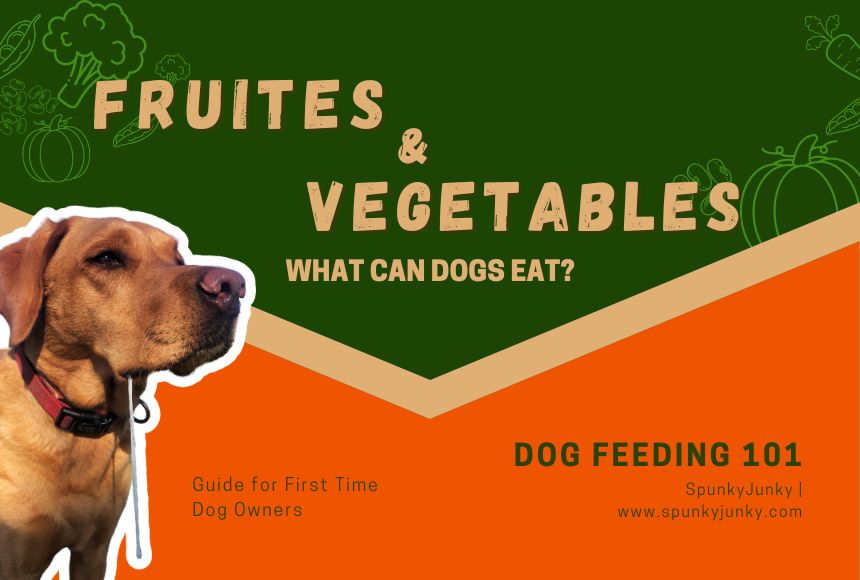08:00 am again, I come back.
Do you guys remember what I told you last time? Yes, the topic we have discussed is "what can't dogs eat". This time we need to switch gears and focus on the good stuff.
Today, we will start learning what fruits and vegetables dogs can eat. And you also need to know how much to feed, while these "snacks" should not replace the main food.
Wake up, rookies! It's time to take notes.
Understanding the Dogs' Nutritional Needs

Before picking out fruits and veggies, let's get a handle on what dogs need to eat. They must have a good mix of protein, carbs, fats, vitamins, and minerals to stay in tip-top shape.
As a general guideline, a balanced dog diet often consists of around:
50% to 75% of high-quality protein
10% to 30% of carbohydrates
10% to 15% of healthy fats
And a moderate amount of vitamins
Although the dog foods sold in stores have a good mix of nutrients, they still need to meet the nutritional needs of most dog breeds. This means these dog foods are unlikely to meet your dog's dietary needs completely.
Thus, extra vitamin and mineral supplements will be necessary. And the easiest way is to feed your dog the right fruits and vegetables.
What Fruits And Vegetables Can Dogs Eat
Now that we've covered the basics let's dig into the exciting part—introducing safe fruits and vegetables to your dog's diet. These tasty treats not only add variety to their meals but also come with their own set of benefits. Here are some dog-approved options.

What fruits can dogs eat?

Apples
An apple a day keeps the doctor away, and it applies to dogs too! Apples are safe for dogs, but you should remove the seeds and core. They provide essential vitamins and dietary fiber, promoting good digestion.

Bananas
This sweet and creamy fruit is a hit with dogs. Bananas are rich in potassium, which helps support proper heart and muscle function. Plus, they offer a healthy dose of vitamins B6 and C.

Blueberries
These tiny powerhouses are packed with antioxidants that can help combat cell damage. They're also low in calories and high in fiber, making them a great choice for a tasty and nutritious treat.

Watermelon
A summer favorite for both humans and dogs, watermelon is safe for your furry companion as long as you remove the seeds and rind. It's hydrating and loaded with vitamins A and C, perfect for a refreshing snack.

Oranges
Oranges are citrus delights that boost vitamin C for your dog's immune system. Remember to serve them in moderation and peel them to avoid choking hazards.

Strawberries
These juicy berries are delicious and a fantastic source of vitamins, antioxidants, and fiber. They make a healthy and satisfying snack for your pup.
When introducing these fruits to your dog, start with small portions and observe their response. Remember that moderation is key, as too much fruit can upset their stomachs due to the natural sugars present. And always be sure to remove any seeds, cores, or inedible parts before serving.
What vegetables can dogs eat?
Moving on to veggies, here are some safe and nutritious options for your dog:

Carrots
Crunchy and packed with beta-carotene, carrots are good for your dog's eyes and serve as a tasty, chewy treat. They're low in calories and high in fiber, making them a paw-some choice.

Green beans
These crunchy veggies are loaded with vitamins and minerals while being low in calories. They can be served raw as a satisfying snack or cooked and mixed into your dog's meals for an added nutritional punch.

Sweet potatoes
Cooked sweet potatoes are delicious and provide a range of vitamins, including A and C, along with dietary fiber. They can be served as a tasty side dish or mashed and mixed with their regular food.

Pumpkin
Pumpkin isn't just for Halloween decorations; it's great for dogs too! It's high in fiber, aiding digestion and promoting a healthy gut. Use plain, canned pumpkin without any added spices or sweeteners.

Spinach
Popeye had the right idea when it came to spinach! This leafy green is loaded with iron, vitamins, and antioxidants. It's best to cook spinach before serving it to dogs to ensure better nutrient absorption.

Broccoli
Broccoli is a cruciferous veggie that offers a range of vitamins and minerals. It can be steamed, cooked, and served in small portions as an occasional treat for your furry friend.
When incorporating these vegetables into your dog's diet, remember to prepare them without any added seasonings, oils, or excessive salt. Steaming or cooking the veggies can make them easier to digest and maximize nutrient availability.
As always, when introducing new foods to your dog's diet, start with small amounts and monitor their reaction. If you have any concerns or questions, it's best to consult with your veterinarian to ensure the best possible nutrition for your canine companion.
So, go ahead and treat your dog to some safe and delicious fruits and vegetables, and watch them wag their tail with delight!
How Many Fruits and Vegetables Should You Provide
I believe you totally understand what fruits and vegetables dogs can eat without fear. I want to talk here about how much you should provide for dogs.
Calculation tips:
1. Calculate Daily Caloric Intake: Determine your dog's daily caloric needs based on size, age, and activity level.
2. Allocate 10% of Calories: Once you have the total daily caloric intake, allocate around 10% of those calories to fruits and vegetables. This will ensure a balanced diet without overshadowing their primary food.
3. Convert Calories to Grams: To convert calories to grams, refer to nutritional information for specific fruits and vegetables. Here is some common information:

2 additional things you need to keep in mind:
1. Consider Fruit and Vegetable Nutrient Density: Keep in mind that different fruits and vegetables have varying nutrient densities. Some may be higher in calories than others, so it's important to consider their nutritional composition and adjust portion sizes accordingly.
2. Monitor Your Dog's Weight and Well-being: Once you've established a starting portion size based on the calculations, monitor your dog's weight, energy levels, and overall well-being. Adjust the portion sizes if you notice any weight gain or loss, or consult with your veterinarian for guidance.
Remember that these calculations provide a general framework, but individual dogs may have unique needs. It's always best to consult with your veterinarian for personalized advice based on your dog's specific requirements, health conditions, and any dietary restrictions they may have.
By combining the general guidelines, considering caloric needs, and monitoring your dog's response, you can provide a balanced and appropriate amount of fruits and vegetables to support their overall health.
Other Fruits and Vegetables that Dogs Can Eat

Pineapple: Dogs can enjoy small amounts of fresh pineapple, which is a good source of vitamins and minerals. However, it should be given in moderation due to its high sugar content.

Mango: Fresh mango can be a tasty treat for dogs, but it should be given in moderation due to its natural sugar content. Make sure to remove the pit, as it can be a choking hazard.

Pears: Dogs can eat ripe pears, but they should be given in moderation and without the seeds or core. Pears provide fiber and vitamins.

Raspberries: These berries are safe for dogs to eat and can be a good source of antioxidants. However, they should be given in moderation due to their small size and natural sugar content.

Blackberries: Similar to raspberries, blackberries are safe for dogs and can be a healthy addition to their diet. They also contain antioxidants and fiber.

Cucumbers: Dogs can enjoy fresh cucumbers, which provide hydration and are low in calories. However, be sure to remove the seeds and peel, as they can be difficult to digest.

Zucchini: Cooked or raw zucchini can be given to dogs as a low-calorie vegetable option. It is a good source of vitamins and fiber.
Conclusion
Rookies, I hope you guys all have woken up now.
We've covered a lot of ground today in our quest to discover what fruits and vegetables dogs can enjoy. By now, you should have a good understanding of the safe and nutritious options available, as well as how to determine the appropriate portion sizes for your furry friend.
Remember, it's all about balance and moderation. Fruits and vegetables should complement your dog's regular diet, not replace it.
Go forth and embrace the wonderful world of dog-friendly fruits and veggies. Your pup will thank you with slobbery kisses and an extra wag in their tail. Happy snacking!






